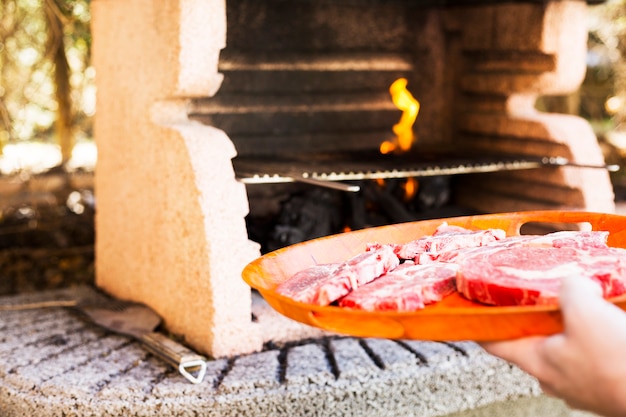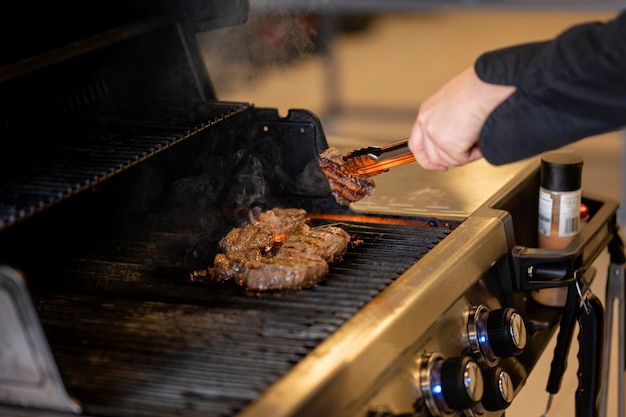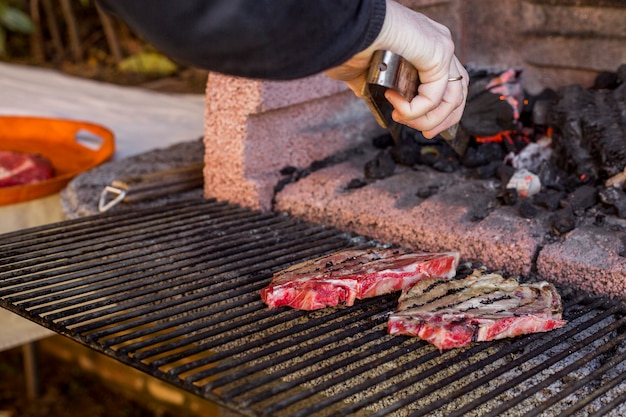Ah, steak. The mere mention of it conjures up images of sizzling, smoky goodness, doesn't it? And for good reason! There's something undeniably satisfying about a perfectly grilled steak, cooked just right, bursting with flavor and juicy to the core. But let's be honest, grilling a steak to perfection isn't always a walk in the park. You've got those seasoned grill masters who swear by their charcoal grills, and then there are those of us who've had our fair share of disappointing steak experiences (myself included!). But fret no more! I'm here to share everything I've learned along the way, so you can confidently grill up the steak of your dreams.
This isn't about fancy techniques or complicated recipes, it's about understanding the basics and mastering those simple steps that truly make a difference. We'll break down every part of the process, from choosing the right cut to achieving that perfect sear, with plenty of personal tips and tricks sprinkled in along the way. Grab a drink, settle in, and let's get cooking!
Part 1: Choosing the Right Cut

The first step to a fantastic steak is choosing the right cut. Think of it like selecting the perfect canvas for your masterpiece. You can grill any cut of beef, but some are naturally better suited for grilling than others. Let's dive into some popular options:
The Classic Strip Steak: My Go-To
My personal favorite? The strip steak, also known as a new york strip. It's a beautiful cut, with a good amount of marbling, which is the white fat dispersed throughout the meat. That marbling gives it a fantastic flavor and adds to its tenderness. A good strip steak is like a blank canvas, ready to soak up the deliciousness of your seasonings and grilling technique.
Rib-Eye: Rich and Buttery
Another classic! The rib-eye is a crowd-pleaser, known for its rich, buttery flavor and juicy texture. It's definitely a treat, but it can be a bit pricey, so be prepared to splurge.
filet mignon: Delicate and Luxurious
The filet mignon is a super tender cut, famous for its delicate flavour. It's a great option if you're looking for a really luxurious steak experience. But be aware, it doesn't have as much inherent flavour as a strip or rib-eye, so you'll want to pay extra attention to seasoning.
Beyond the Classics: Expanding Your Horizons
Don't be afraid to venture beyond the classics! There are tons of other fantastic cuts perfect for grilling. Consider the ribeye cap, skirt steak, or hanger steak. Each cut has its own unique characteristics, so do your research and find one that tickles your fancy and fits your budget.
Tips for Choosing the perfect steak: What to Look For
Here's what to keep in mind when you're picking out your steak:
- Thickness: Aim for a steak that's at least 1 inch thick. This will ensure even cooking and a juicy result. You want your steak to be substantial, not thin and flimsy.
- Marbling: The more marbling, the better! That white fat melts during cooking, adding flavor and tenderness. You can usually tell by looking at the steak, but feel free to ask your butcher for their expert opinion.
- Color: The meat should be a deep red, with no grey or brown spots. A vibrant color indicates freshness.
Remember, a good butcher can be a real asset in helping you choose the perfect steak. They're experts in cuts and will be able to give you great tips on how to cook them.
Part 2: Prepping Your Steak for Grill-Ready Glory

Now that you've got your beautiful cut of meat, it's time to get it ready for the grill. These steps might seem simple, but they're crucial for achieving that perfect steak!
Room Temperature Steak: A Simple Yet Vital Step
One of the biggest mistakes people make is grilling a cold steak. It can lead to uneven cooking, and you might end up with a tough, dry piece of meat. Always let your steak come to room temperature before grilling. It takes about 30 to 45 minutes, depending on the thickness of the steak. Just place it on a plate or cutting board and let it sit. Trust me, this simple step makes a world of difference!
Seasoning Your Steak: A Symphony of Flavor
Now for the fun part! Seasoning your steak isn't just about adding flavor; it's about creating a delicious crust that helps lock in the juices during grilling.
Don't go overboard with seasoning! A simple seasoning allows the natural flavor of the steak to shine through. My go-to is a blend of salt, pepper, and garlic powder. It's simple yet delivers a perfect balance of flavour. You can experiment with other herbs like thyme, rosemary, or oregano, but keep it simple.
Here’s the key: season generously and rub the seasoning into the steak. I'm talking about a good coating. You want that seasoning to be well-integrated into the meat, not just sitting on top.
Patting Dry: A Crucial Step Many Forget
This is a crucial step that many people skip. Pat your steak dry with paper towels before grilling. This will help to remove excess moisture that can lead to steam, which can make your steak cook unevenly. You want a dry surface for that perfect sear!
Part 3: Mastering the Grill: Gas vs. Charcoal

Now we're getting to the heart of it! Time to fire up the grill and unleash that delicious smoky flavour. Whether you're using a gas grill or a charcoal grill, mastering the heat is key.
Gas Grill: Achieving the Perfect Heat
If you're using a gas grill, set the burners to high heat. You want the grill to be really hot for that amazing sear. I usually preheat my grill for 10 to 15 minutes before grilling. This gives the grill enough time to reach that scorching temperature.
Charcoal Grill: The Dance with the Flames
With a charcoal grill, you want to use a good amount of charcoal, enough to create a substantial bed of coals. Light the charcoal and let it burn until it turns grey and has a good layer of ash on top. This indicates that the charcoal is hot and ready to go. It's a bit of a dance with the flames, but it's well worth the effort for that smoky flavor.
Clean Grilling Grates: A Must for Success
No matter what type of grill you use, it's essential to clean your grill grates. You want to make sure they're clean and oiled to prevent sticking. This helps you achieve those beautiful grill marks that we all love, and it keeps your steak from getting stuck, which is a real grilling bummer.
Part 4: The Art of the Sear: A Crispy, Juicy Symphony
Here's where things get truly exciting! The sear is the key to creating a delicious, juicy steak. It's all about that beautiful crust, the crispy exterior, and the juicy interior. It's a dance of heat and timing that results in a steak that's both visually appealing and bursting with flavor.
High Heat is Key: The Foundation of a Great Sear
As we mentioned earlier, high heat is essential for a good sear. If you're using a gas grill, you want the burners on high. With a charcoal grill, you want a bed of hot, glowing coals. That intense heat is what creates the perfect sear.
Strategic Placement: Mastering the Grill Zone
The next step is crucial: placement. You want to place your steak directly over the hottest part of the grill. This creates that delicious sear and helps cook the steak quickly and evenly. You'll hear that satisfying sizzle as the steak hits the hot grill!
Timing is Everything: The Sear Dance
Let the steak cook undisturbed for about 2 to 3 minutes per side, or until you see a nice, crispy crust forming. Don't move it around too much during this initial sear. Let it get that good sear on each side before moving on to the next step.
Part 5: Cooking to Perfection: The Final Stages
The sear is a crucial first step, but now it's time to finish cooking the steak to your desired level of doneness. We want to cook it evenly, without overcooking it and making it tough. Remember, we're aiming for juicy and tender, not dry and chewy.
Move to Indirect Heat: Controlling the Temperature
Now, move your steak to a cooler part of the grill. You want to cook it over medium-low heat to finish cooking it through without burning the outside.
For a gas grill, this means moving it to a burner that's not set to high heat. For a charcoal grill, it means moving it to the side where there are no coals. You're essentially creating a temperature gradient on your grill.
The internal temperature: The Key to Success
It's all about the internal temperature, folks! This is where a meat thermometer becomes your best friend. I like to use a digital thermometer because it gives me accurate readings and helps me avoid overcooking.
steak temperature Guide: Doneness Levels
Here's a general guide for the internal temperatures of different levels of doneness:
| Doneness | Internal Temperature |
|---|---|
| Rare | 125°F (52°C) |
| Medium-Rare | 130°F (54°C) |
| Medium | 140°F (60°C) |
| Medium-Well | 150°F (66°C) |
| Well Done | 160°F (71°C) |
Of course, everyone has their preferred level of doneness. Personally, I love my steak medium-rare, but it's all about what you enjoy.
Resting is Crucial: Letting the Juices Redistribute
Once your steak has reached your desired internal temperature, it's time to let it rest. This is a crucial step that often gets overlooked. Let the steak rest for 5 to 10 minutes before slicing and serving. This allows the juices to redistribute throughout the steak, resulting in a juicier, more tender cut. It’s an essential step for a truly delicious steak!
Part 6: Perfecting the steak accompaniments: A Symphony of Flavor
A great steak deserves equally fantastic accompaniments! Think of it as a well-rounded symphony of flavor. You want to complement the steak, not overpower it.
side dishes: Balancing the Plate
From classic potato salad to roasted vegetables, the possibilities are endless. I love serving my steak with a simple salad, some roasted asparagus, or creamy mashed potatoes. You can also try some grilled corn on the cob for a smoky flavor. The key is to choose side dishes that enhance the steak, not compete with it.
Sauces: The Finishing Touch
A little drizzle of sauce can really elevate your steak to the next level. My personal favourites? A simple chimichurri sauce, a creamy béarnaise sauce, or a classic peppercorn sauce. These sauces add a touch of complexity and richness to the steak without overwhelming its flavor.
Part 7: Troubleshooting Common grilling mistakes: Navigating the Challenges
Okay, we've all been there. Even experienced grill masters make mistakes. But understanding common grilling mistakes can help you avoid them. Here are some common challenges and how to overcome them:
The Overcooked Steak: A Common Issue
If your steak is overcooked, it's usually because it was cooked on too high heat for too long. To prevent overcooking, always use a meat thermometer and keep a close eye on your steak. Don’t rush the process, take your time, and check the internal temperature regularly.
The Dry Steak: A Frustrating Outcome
A dry steak is often a result of overcooking. You can also end up with a dry steak if you haven't prepped it correctly, like forgetting to pat it dry. Remember, preheating, patting dry, and resting are all crucial! Those steps ensure your steak stays juicy and flavorful.
The Stuck Steak: The Frustration of Grilling
If your steak is sticking to the grill, it's likely because the grill wasn't hot enough, or you didn't oil the grates. Remember to preheat your grill and oil those grates for the perfect sear! A clean, well-oiled grill is your best friend when grilling steak.
Part 8: FAQs: Clearing Up Common Steak Questions
Let's clear up some common questions people have about grilling a perfect steak.
1. Can I Grill Frozen Steak?
I don’t recommend it! Frozen steak won’t cook evenly, and it will take much longer to reach the right internal temperature. Let your steak thaw in the fridge overnight before grilling. This ensures that it cooks evenly and to the desired level of doneness.
2. What's the Best Way to Cook a Steak?
It depends on your preferences! But I always recommend grilling over high heat for a nice sear, then finishing it over indirect heat to reach the desired level of doneness. This technique creates that beautiful crust and ensures the steak is cooked through without drying out.
3. Should I Use a Meat Thermometer?
Absolutely! It’s the best way to ensure that your steak is cooked to your preferred level of doneness, without overcooking it. A meat thermometer takes the guesswork out of grilling, ensuring you get the perfect results every time.
4. How Can I Make My Steak More Tender?
Choose a cut with good marbling, and make sure to let it rest for 5 to 10 minutes after cooking. You can also try using a marinade, which can help to tenderize the meat. But the key is to choose a cut that's naturally tender, like a strip or a ribeye.
5. What Kind of Grill is Best for Steak?
Both gas and charcoal grills can produce delicious steaks. I prefer a charcoal grill because it gives the meat that smoky flavor. But ultimately, the best grill is the one that you enjoy using the most. Whether it's gas or charcoal, find the grill that makes grilling a pleasurable experience.
Part 9: Final Thoughts: Embrace the Journey
So, there you have it! My ultimate guide to grilling a perfect steak. From choosing the right cut to nailing that perfect sear, we've covered everything you need to know to impress your friends and family with a delicious, juicy steak. Remember, it's all about practice and having fun in the kitchen, or on your grill. Don’t be afraid to experiment and discover what you love.
Now, go out there and grill up a storm!
Everyone is watching

Prime Rib Roast Cooking Time Chart: Per Pound Guide
Cooking TipsPrime rib roast. Just the name conjures images of lavish dinners, crackling fires, and hearty laughter. It’s ...

How Long to Bake Potatoes in the Oven (Perfect Every Time)
Cooking TipsBaked potatoes are a staple in my kitchen. They're incredibly versatile, delicious, and surprisingly easy to m...

Perfect Rice Every Time: The Ultimate Guide to Cooking Rice
Cooking TipsAs a self-proclaimed foodie, I've always been a bit obsessed with rice. It's the foundation of countless cuisi...

The Ultimate Guide to Cooking Asparagus: Tips, Techniques, and Recipes
Cooking TipsAsparagus. The mere mention of this spring delicacy conjures up images of vibrant green spears, crisp and burs...

Ultimate Guide to Cooking the Perfect Thanksgiving Turkey
Cooking TipsThanksgiving. Just the word conjures up images of overflowing tables laden with delicious food, the scent of r...
